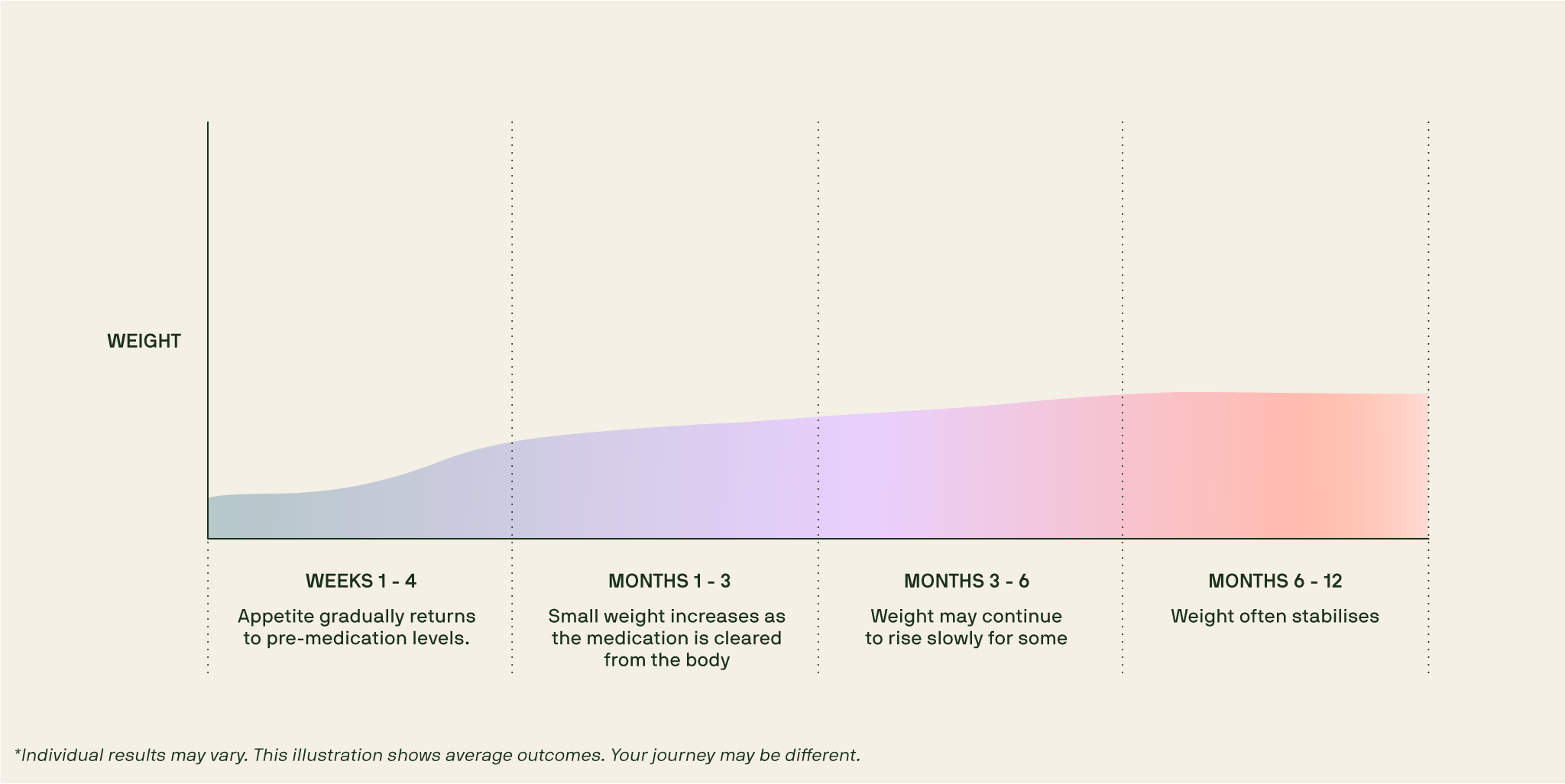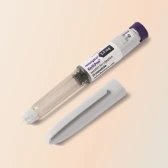To get the most out of weight loss medications like Mounjaro, they’re typically taken for at least a year alongside healthy lifestyle changes. Upon reaching their target weight, some patients are likely to opt for down-titriation or discontinue their treatment. While they’re not intended for indefinite use, that doesn’t mean everyone has to stop at a fixed point. Some people may continue on treatment longer, especially at a lower maintenance dose if it helps sustain their progress.
If you’re doing well on Mounjaro, it’s completely normal to feel nervous about stopping and potentially regaining weight. In fact, our research found that fear of regaining weight after stopping medication is a major barrier to trying GLP-1s, with 44.6% citing it as their biggest concern. It’s true that Mounjaro’s effects wear off when you stop taking it, but by then, you’ll likely have built habits that help support your progress — and in some cases, a maintenance dose may be an option to help you sustain your results. Here’s what you need to know.

What is Mounjaro and how does it help with weight loss?
First things first: what does Mounjaro do? It’s a weekly injection for weight loss that hat mimics the effects of two key hormones involved in appetite and metabolism: GLP-1 and GIP. These hormones help regulate blood sugar, digestion, and hunger signals.
Mounjaro helps you feel fuller for longer by:
- Slowing down digestion (so food stays in your stomach longer),
- Increasing insulin release after eating (which also sends signals of fullness to the brain),
- And directly interacting with appetite centres in the brain.
And because it brings on these effects via the actions of two hormones rather than one, like Saxenda and Wegovy do, Mounjaro is considered the more potent medicine.
How long does it take to regain weight after stopping Mounjaro?
It’s normal for your appetite to increase a little once you stop treatment, as your body readjusts. However, this doesn’t mean you’ll automatically regain all the weight you’ve lost.
In the SURMOUNT-4 trial, some people did see weight changes after stopping Mounjaro, but many successfully maintained significant weight loss long-term, especially those who kept up with healthy eating, regular activity, and other lifestyle changes.
Here’s what research shows about what to expect:
- Weeks 1 to 4: Appetite gradually returns to pre-medication levels.
- Months 1 to 3: Some individuals notice small weight increases as the medication is cleared from the body
- Months 3 to 6: Weight may continue to rise slowly for some, focus on lifestyle measures and nutrition can be key here
- Months 6 to 12: Weight often stabilises.
Importantly, even after stopping treatment, participants in the study maintained, on average, nearly 10% of their starting weight loss a year later. Many kept at least 80% of their initial weight loss.
This shows that with ongoing diet and lifestyle efforts, it’s very possible to maintain much of the progress you’ve achieved.
If you're feeling unsure about coming off treatment, you're not alone, and we're here to help. Our Maintenance Programme is designed to support you long term. That might mean:
- Finding a maintenance dose that helps you hold steady
- Or coming off completely, knowing you can restart treatment in the future if you need a reset—no need to return to your starting weight.

Mounjaro withdrawal symptoms
The good news is that stopping Mounarjo isn’t known to cause withdrawal symptoms like you might experience when coming off some other medications.
But there are a few potential effects to be aware of. When you stop taking Mounjaro, the effects of the drug, primarily those related to blood sugar and appetite, will be reversed.
Potential effects after stopping Mounjaro
When you stop taking Mounjaro, its effects will diminish as it gradually gets flushed out of your system. Based on what we know from scientific research, here’s what that might look like.
Increased appetite
It’s completely normal to notice your hunger starting to return within 2–4 weeks after your last Mounjaro dose, with most people feeling back to their usual appetite levels by around 4–6 weeks. This happens gradually as the medication leaves your system, since it has a half-life of about 5 days.
While the return of hunger can feel a little daunting at first, it’s a sign your body is readjusting—and that’s okay. The medication supported you, but it didn’t do all the work. Give yourself credit for the effort you’ve put in: from improving your diet to building a more active lifestyle.
These new habits don’t disappear just because you’ve stopped treatment. They’ll continue to help you feel more in control. Yes, this phase may require a bit more mindfulness and willpower, but it does get easier. And if you gradually reduce your dose rather than stopping suddenly, that can make the transition smoother too.
Don’t forget: your coach is here to help with strategies to manage cravings and feel more confident navigating this next step.
Blood sugar
After stopping Mounjaro, blood sugar levels usually return to your baseline within 4–6 weeks if you don’t have diabetes. That’s because the medication lowers blood sugar, so once it’s out of your system, levels settle back to where they were before treatment.
If you have type 2 diabetes and your doctor reduced your other anti-diabetic medications while on Mounjaro, it’s important to recheck your blood sugar after stopping. Your dose may need adjusting again, especially if levels begin to rise. HbA1c can increase by 1–2% within 3 months for some people.
That said, the weight loss and lifestyle changes you've made on your weight loss journey, can help keep your blood sugar more stable long term—even without Mounjaro.
Digestive issues
Gut-related side effects are common on Mounjaro, affecting over one in ten people. So, those symptoms should ease when you stop taking it.
How to prevent weight gain after stopping Mounjaro?
There are proven strategies to minimise weight regain after discontinuing Mounjaro. The key is implementing lifestyle changes and habits that support long-term weight maintenance.
Research shows that combining dietary modifications, regular exercise, and behavioural strategies can help preserve much of your weight loss progress.
As we saw earlier, it is possible to keep a good amount of weight off after you stop taking Mounjaro. And FYI: losing just 5% of your weight can bring on health benefits.
This also feels like a good time to remind you that your journey is not about the numbers on the scale. It’s about making lasting, healthy changes that support your body to work at its best.
By the time you come off Mounjaro, you’ll have settled into a diet and exercise routine. And sticking to it will go a long way in maintaining your health and progress.
Strength training
All exercise is good for you. But when it comes to weight loss, strength training is particularly beneficial. Your muscles are active tissues that use energy so if you build more muscle, your body’s energy needs will go up. This can help you burn more calories.
Aerobic exercise is important, too. It’s good for your heart and has been shown to support weight loss. In fact, in some studies, combining both aerobic and strength training led to the best results.
Aim for at least two strength sessions and at least 150 minutes of moderate-intensity movement per week.
Eat well
Excuse us for trotting out a cliché, but you really are what you eat. Diet is one of the most important elements of a weight loss plan and in improving your general health.
Reach for foods that keep you full while having fewer calories, and that will give your body the essential nutrients it needs.
Think lean sources of protein (fish, tofu, chicken), plenty of fruit and veg, and wholegrain carbohydrates (these will be digested slower and keep you feeling satisfied).
Be kind to yourself
After all your hard work, it’s completely natural to feel nervous about what happens next. A small amount of weight regain can be normal after stopping any weight loss treatment.
But that doesn’t mean you’re back at square one. The habits, routines, and mindset you’ve built along the way stay with you—and those are what really support long-term success. Be gentle with yourself as your body settles into this new phase. You’ve come so far already, and you’ve got the tools to keep going strong.
Showing yourself some compassion can help you feel better and motivate you to keep up your routine. We know you’ve got this!
How to stop taking Mounjaro safely
If you're thinking about stopping Mounjaro, your first step should be to speak with your clinician. They’ll help you decide the right timing for your final dose and whether it's best to taper off gradually or transition to a lower, long-term maintenance dose. This depends on your goals, current results, and how your body is responding.
At Voy, we usually recommend slowly reducing your dose rather than stopping suddenly. This gives your body time to adjust and lowers the chance of weight regain.
You may also decide to stay on the lowest effective dose to help maintain your results, as long as your BMI stays within a healthy range.
During this phase, we strongly encourage booking a session with your health coach. They’ll support you in making lifestyle adjustments, reinforcing long-term habits, and helping you feel confident and in control of your next steps.
Once you’ve taken your final dose of your Mounjaro weight loss injection, be sure to dispose of your pen safely by following the instructions in your leaflet.
Maintaining your progress
If you’ve already started your weight loss journey, that’s brilliant—we’re so excited for you to reach your health goals.
But you don’t have to do it alone. You can get one-to-one support and guidance from our expert coaches, plus weight loss medications, through our weight loss programme. And when it’s time for you to come off the medicine, you’ll have forged healthy habits that will last you a lifetime.
You can take your next step right now. Fill out this short form to see if you’re eligible for the programme. It won’t take more than a few minutes.












